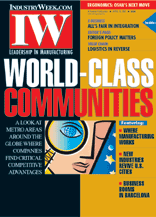Barcelona: locational advantages and disadvantages
Barcelona is one of the world's twelve most successful manufacturing cities. It has emerged as the Mediterranean's most important trading and shipping route centre, with a striking range of industry from the heaviest and lowest tech to the lightest and highest tech. It stands out from the rest, believes the magazine 'Industry Week', simply because it is best at developing, making, marketing, moving and managing products.
|
Barcelona: Industry Week Magazine's best of the best. |
Barcelona's strategic location, on the Mediterranean Sea, at the mouth of two river valleys that form natural inland routes through the mountains, and close to the border with France has helped its emergence as Spain's main industrial and commercial centre. But just as important are the cultural factors and work ethic of the Catalan community.
The advantages:
-
The Mediterranean climate that creates an exceptional working and leisure environment.
-
A long tradition of trade and commerce dating back to before the voyage of Christopher Columbus to the Americas.
-
An ideal climate and fertile soils for high-quality horticulture and wine production.
-
At the centre of a motorway network that links Barcelona with France and the key Spanish industrial cities of Madrid, Zaragoza, Valencia and Bilbao.
-
Spain's most accessible and closest industrial region to Europe's wealthy core markets.
-
International airport.
-
Excellent rail network, soon to benefit from a high-speed link, currently under construction, to the rest of Europe.
-
Other aspects of infrastructure, e.g telecommunications, that are amongst the best in the world.
-
A very supportive regional government.
-
Business incubator schemes, e.g. Barcelona Activa, funded by the city government and private institutions
-
A very strong work ethic. A 'mañana' culture is rarely encountered.
-
A strong tradition of using education to get ahead, thanks to the historically large middle class in the region.
-
High-quality education at the university level.
-
International schools, including British, American, German and Japanese.
-
Other quality of life advantages including some of the world's best foods, (the El Bulli restaurant in Roses was rated the best in the world in March 2002 by Restaurant magazine), and ski resorts within two hour's drive from the city.
-
Located in an area of outstanding and unspoilt natural beauty.
-
Large local market of 4 million people.
-
Wage levels amongst the lowest in Europe.
-
Lower housing and other costs compared to the European core countries.
-
An exceptional art and architecture cultural heritage that attracts large numbers of higher-echelon high-spending visitors.
-
High-quality Mediterranean beaches.
-
A reputation as a fashion Mecca rivalling Milan or Paris.
-
A key destination for low-cost airlines.
-
Non-EU company products manufactured in Barcelona can be sold in Europe tariff-free.
-
The economic advantages of clustering (cumulative causation).
The disadvantages:
-
A 'we speak Catalan here' culture which tends to drive some would-be foreign investors towards Madrid.
-
On the periphery of the European core market with high transport costs.
-
High electricity costs.
-
A three-hour afternoon shut-down for many businesses.
-
Low government investment incentives, such as subsidies or tax-free breaks.
-
A shortage of skilled workers.

